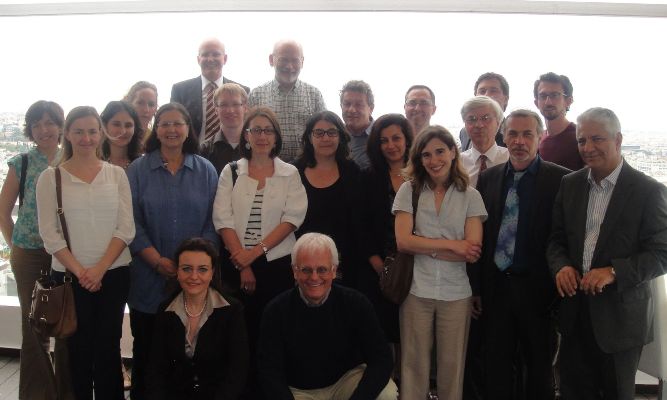Internal
Shallow vs. Deep Integration in the Southern Mediterranean: Scenarios for the region up to 2030
Thu, 29/03/2012 - 18:12 | by adminThis research develops a quantitative analysis aimed at simulating the trade effects of various integration scenarios between the EU and its Mediterranean Partners (MPs). Results for shallow integration show that the completion of tariff removal is expected to produce limited gains, except in Algeria. However, further steps toward deep integration would lead to much more significant gains. In this regard, the elimination of non-tariff barriers is expected to increase EU exports to MPs up to 60%.
| Attachment | Size | Hits | Last download |
|---|---|---|---|
| MEDPRO TR 13 Ghoneim et al Shallow vs Deep Integration.pdf | 609.73 KB | 3865 | 1 day 9 hours ago |
Challenges arising from Capital Account Liberalisation in the Countries of the South Mediterranean Region
Thu, 29/03/2012 - 18:06 | by adminThis MEDPRO Technical Report confirms the importance of commercial openness and macroeconomic performance (i.e. the control of inflation and stability of current account balance and exchange rate) on growth dynamics in the south Mediterranean countries. In particular, the positive impact of capital account liberalisation is conditioned by the imperative reinforcement of institutional quality, country risk reduction, and government stability.
| Attachment | Size | Hits | Last download |
|---|---|---|---|
| MEDPRO TR No 11 WP6 Mouley.pdf | 1.02 MB | 5451 | 17 hours 53 min ago |
MEDPRO Marseille Meeting
Fri, 23/03/2012 - 09:12 | by adminCarbon Market Opportunities in Southern Mediterranean Countries
Mon, 19/03/2012 - 12:45 | by adminTo date, Southern Mediterranean countries have hosted a limited number of projects under the Clean Development Mechanism (CDM). There are three challenges to the participation of middle income countries in future carbon markets: the limited size of future demand for offsets or credits; restrictions on the use of CDM credits in Phase III of the EU Emissions Trading Scheme; and the lack of prompt preparation for the start of new market-based mechanisms. This study examines existing and emerging activities in Southern Mediterranean countries that could fit into new market based mechanisms.
| Attachment | Size | Hits | Last download |
|---|---|---|---|
| MEDPRO TR No 8 WP4b Fujiwara et al.pdf | 816.39 KB | 2450 | 3 days 1 hour ago |
Determinants of Growth and Inflation in Southern Mediterranean Countries
Fri, 16/03/2012 - 11:02 | by adminDespite significant economic reforms in many EU neighbouring countries in the Southern Mediterranean, their growth performance has on average been subdued. This study analyses the differences in growth performance and macroeconomic stability across Mediterranean countries, to draw lessons for the future. The main findings are that Southern Mediterranean countries should benefit from closer ties with the EU that result in higher levels of trade and FDI inflows, once the turbulence of the ‘Arab Spring’ is resolved, and from the development of financial markets and infrastructure.
| Attachment | Size | Hits | Last download |
|---|---|---|---|
| MEDPRO TR No 10 WP5 Coutinho.pdf | 693.04 KB | 5807 | 4 days 4 hours ago |
The EU-Turkey Customs Union: A Model for Future Euro-Med Integration
Wed, 14/03/2012 - 14:29 | by admin| Attachment | Size | Hits | Last download |
|---|---|---|---|
| MEDPRO TR No 9 WP5 Togan.pdf | 442.83 KB | 5083 | 4 days 12 hours ago |
MEDPRO Athens Meeting
Mon, 05/03/2012 - 12:34 | by admin
MEDPRO Athens Meeting
Tue, 28/02/2012 - 21:41 | by adminMEDPRO Athens Meeting
Tue, 28/02/2012 - 21:38 | by adminAlgeria’s Failed Transitions to a Sustainable Polity: Coming to yet another Crossroads
Fri, 28/10/2011 - 15:49 | by adminAlgeria is so far the only country in North Africa not to have experienced sustained mass protests calling for political change. The government in Algiers has by no means remained indifferent to the groundbreaking events in neighbouring countries, but it is responding to this sweeping wave of change at its own pace. This paper argues that, despite its apparent stability, the Algerian polity suffers from underlying currents of instability that risk undermining the long-term sustainability of the state.
| Attachment | Size | Hits | Last download |
|---|---|---|---|
| MEDPRO TR No 7 WP2 Darbouche.pdf | 457.53 KB | 1893 | 6 hours 24 min ago |







